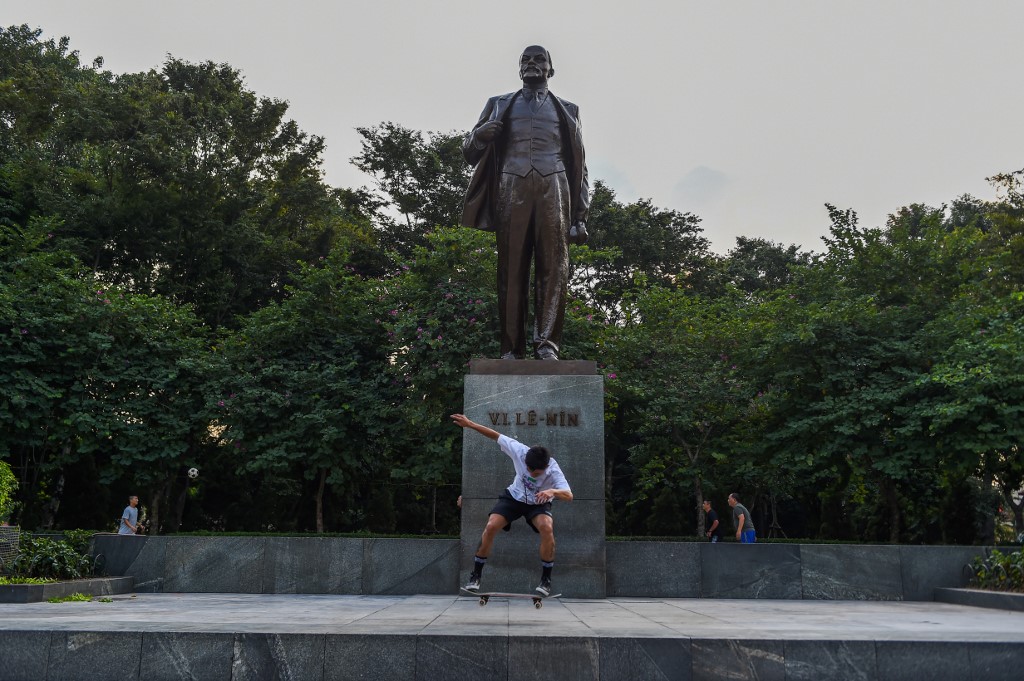
In this photo taken on November 25, 2019, Tran Dinh Anh practices skateboarding in front of Lenin statue at Lenin Park in Hanoi. – They have few places to practice, no public funding and little public support, but Vietnam’s first professional skateboard team are carrying high hopes of winning big at the upcoming SEA Games. (Photo by Nhac NGUYEN / AFP) / TO GO WITH SEAGames-2019-skateboarding-VIE-Vietnam , FOCUS by Jenny VAUGHAN
They have few places to practice, no government funding and little public support, but Vietnam’s first national skateboard team is carrying high hopes of winning medals for their country.
The youth-friendly sport is being featured for the first time in the Southeast Asian Games, which open in the Philippines on Saturday, and it will also debut at next year’s Tokyo Olympics.
But skateboarding’s reputation as a teenage, counter-culture hobby has been a major hurdle for the sport in Vietnam where there are no proper training facilities and just a handful of skate shops.
“The biggest problem is that we don’t have a skate park,” said Do Ngoc Linh, the manager of Vietnam’s three-person skateboarding squad heading to Manila this weekend.
His troubles don’t end there.
Though the Vietnam General Administration of Sport has recognized skateboarding as a sport, it does not offer any funding for training or travel.
Instead, the squad secured sponsorship to help fund their trip to the Games, where they will compete in the game of skate and street skate categories.
The team has been practicing for several hours most days, gathering at an abandoned basketball court where they’ve installed a few rails and benches.
Some days they go to Lenin Square or other public grounds, popular skate spots in the city sometimes crowded with children or tourists — or foul-tempered police trying to shoo them away.
With no skate parks in Hanoi they won’t be trying their hand in the Park category, which includes bowls or ramps, nor will they be racing in the Downhill.
But that’s not holding back their ambitions.
“I want gold,” 23-year-old Tran Dinh Anh told AFP, his skateboard underfoot.
‘I fell in love with it’
Regardless of the results, the team knows that even just going to the Games is a chance to re-brand the sport back home, where it is known as a frivolous — and dangerous — pastime by some.
“This is really important for us because any medal we get, the sports federation can help make the sport bigger and make a skate park,” said Linh, who opened the city’s first skate shop 10 years ago.
“People can see this is not just something for the street — this is a sport,” he added.
Back when he opened his store there were few customers and almost no awareness of the sport, but today he estimates there are a few thousand skaters in the city.
Most are young and like his team members were first exposed to it on YouTube or in music videos.
“I fell in love with it… I realized there’s a culture that comes with it — music, fashion, arts,” said 20-year-old teammate Tong Cam Vu, who practices with Japanese pop blaring in his earphones.
He hopes that skate culture will continue to spread in the buttoned-up capital of communist Vietnam, where more than half the country’s 95 million people are under the age of 30.
Coach Linh anticipates the biggest competition at the SEA Games will be from established skateboarders from Indonesia, Philippines or Thailand, where facilities are years ahead of Vietnam’s.
But still, he’s hopeful about the team’s prospects.
“I think we have a chance, I’m just hoping we get something,” he said